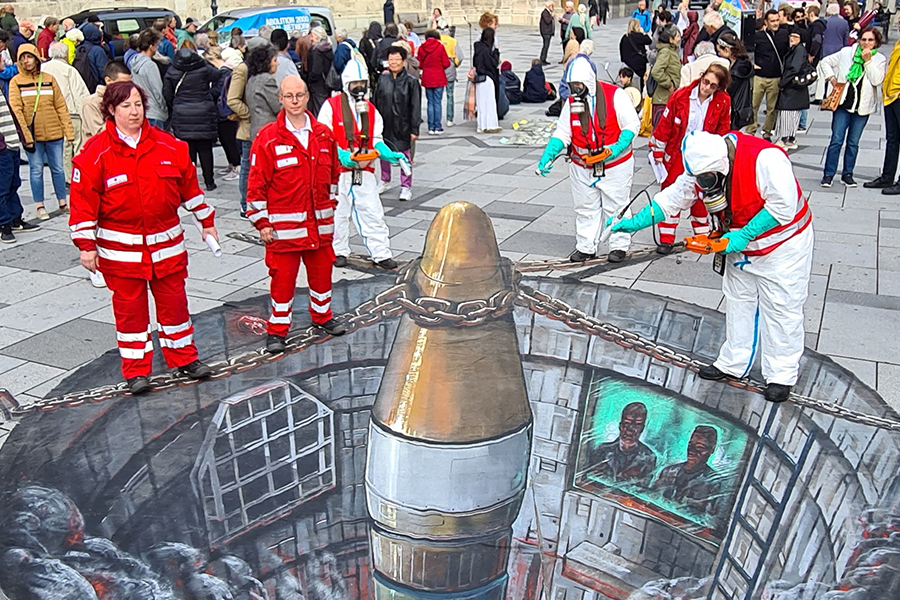June 30, 2004
By Kim Cranston
San Francisco Chronicle
As we witness the transfer of sovereignty in Iraq, I wonder what my father, the late Sen. Alan Cranston, D-Calif., would have thought about the situation there.
A few days before he passed away in December 2000, he completed a book entitled “The Sovereignty Revolution.” The book explored ways humanity can effectively address global challenges, from climate change to terrorism and genocide. He concluded that our concept of sovereignty, which is “widely and unwisely thought . . . to mean only national sovereignty,” helped make the 20th century the bloodiest in history. He argued humanity will not survive the next century unless we revise our concept of sovereignty to acknowledge the primacy of the individual and emphasize the importance of strengthening transnational organizations and international law.
My father didn’t live to witness the horrors of Sept. 11, 2001, or the ensuing war on terrorism. But his book warned of a terrorist attack on the United States, and specifically named Osama bin Laden as a possible perpetrator. He believed such horrors are preventable. “The answer,” he wrote, “will likely be found to lie in adding one more layer of citizenship — world citizenship — to the national and lesser layers among which sovereignty is presently dispersed. This would at long last enable individuals to act upon and embrace not only their traditional national citizenship, patriotism and allegiance, but also their global citizenship, their planetary patriotism, their allegiance to humanity.”
To be sure, my father was not calling for a world government, but for something far more nuanced. He was calling for “the deliberate pooling, through democratic processes of consent, of strictly limited and carefully defined portions of the sovereignty of individuals so as to obtain what cannot otherwise be had.”
He did recognize, however, the United Nations’ distinct potential to cope with global problems. “When a nation becomes the violator rather than the protector of the rights and liberties of its citizens, it is now often the United Nations that is called upon by the conscience of humanity to intervene.”
But the United Nations also “lacks the requisite tools,” he wrote. The main tool it needs is a carefully defined share of sovereignty from each of us. To the naysayers, my father would answer, “This is not as revolutionary as it might sound. . . . Actually, most of the nations and people of the world have already placed a portion of their sovereignty in the U.N.” The only nation- states other than the Vatican that have not taken this step are the five veto- wielding members of the U.N. Security Council: China, France, Russia, the United Kingdom and the United States. Any of the five can exercise its sovereignty to block U.N. actions.
The United Nations is not the whole answer, however. “Portions of American sovereignty and that of other nations and their people have already been delegated to other regional and global institutions. . . . ” The earliest such actions had to do not with momentous issues such as war, peace and violence but with small and routine day-to-day cross-border commercial transactions and social intercourse. Prime early examples of treaties and institutions created for such purposes were the Postal Union, the Telegraph Union and the Patent Convention, all negotiated in the latter half of the 19th century when the first signs and tokens of globalism were encountered. Each of these agreements brought about limited transfers of sovereign authority to global institutions.
In essence, my father was calling for a long-overdue change — to make the United Nations and the rest of the international system democratic, with the United States leading the way. “If no giants appear to lead the way,” my father wrote, “then it will fall to the members of civil society to demand more of the leaders they have — if need be engaging in a supreme exercise of their own sovereignty by transforming leaders into followers who are made to understand that common people will accept nothing less than uncommon actions from them.”
Kim Cranston is chairman of the Global Security Institute, based in San Francisco. Sen. Alan Cranston’s book, “The Sovereignty Revolution,” edited by Kim Cranston and published by Stanford University Press, will be published in July.
Jonathan Granoff is the President of the Global Security Institute, a representative to United Nations of the World Summits of Nobel Peace Laureates, a former Adjunct Professor of International Law at Widener University School of Law, and Senior Advisor to the Committee on National Security American Bar Association International Law Section.








